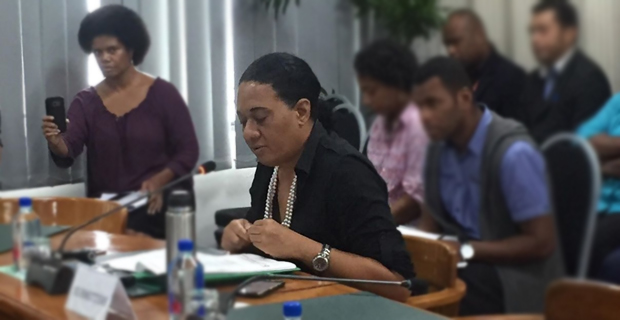
The National Federation Party says changes need to be made to the Online Safety Bill before it returns to parliament, and the Parliamentary Committee should be given 6 months to have thorough consultations.
While presenting their submission to the Committee On Justice, Law and Human Rights, NFP’s Vice President, Seini Nabou said that the bill in it’s current form is very unclear and murky.
Nabou says the bill does not define responsible online behaviour and as Fiji heads to the polls this year, it is absolutely justified for any political party to be anxious that the chilling of free speech online is at risk.
She says the fine line of balance is a grey area but in the bill, we could come to the point where the grey area is determined by the state.
Nabou says the NFP proposes that the Online Safety Bill adopt the ten Communication Principles from the New Zealand Harmful Digital Communications Act 2015 to strengthen what responsible online behaviour means in the bill.
Nabou also says that while the Online Safety Bill purports to protect minors, there will be situations, as has been very recently highlighted in New Zealand media where minors can also commit online offences, such as at Christchurch Boys High School where a student took a photo up a teacher’s skirt and another uploaded a video of a teacher onto a porn website.
She says this is a converse situation, where it is incumbent on the committee to also consider why the bill needs extensive and more thorough consultations with the public.
Nabou also says that while the Online Safety Bill purports to protect minors, there will be situations, as has been very recently highlighted in New Zealand media where minors can also commit online offences, such as at Christchurch Boys High School where a student took a photo up a teacher’s skirt and another uploaded a video of a teacher onto a porn website.
She says this is a converse situation, where it is incumbent on the committee to also consider why the bill needs extensive and more thorough consultations with the public.
Nabou also says that there is no such responsibility placed upon service providers, such as social media service that can compel instant redress or removal of offensive material.
Under the Online Safety Bill, a person who posts an electronic communication with the intention to cause harm to an individual or the position of the individual, commits an offence.
The person who commits an offence is liable upon conviction to - in the case of an individual, a fine not exceeding $20,000 or imprisonment for a term not exceeding 5 years or both; and in the case of a company, a fine not exceeding $100,000, and for a director, chief executive officer, manager or officer in charge for the time being, to a fine not exceeding $50,000 or to a term of imprisonment not exceeding 7 years, or both.
In determining whether posting an electronic communication would cause harm, the court may take into account any factor it considers relevant, including the extremity of the language, images or videos used; the age and characteristics of the individual concerned; whether the electronic communication was anonymous; whether the communication was repeated; the extent of circulation of the electronic communication; whether the electronic communication is true or false; and the context in which the electronic communication appeared.
The bill also states that a person must not post or threaten to post an intimate visual recording of an individual. This does not apply if the individual, who is the subject of the electronic
communication concerned, consents to the specific post of the intimate visual recording. In this section in the Online Safety Bill, “consent” must be voluntary, expressed and informed, and does not include the consent of a child.
Stay tuned for the latest news on our radio stations

